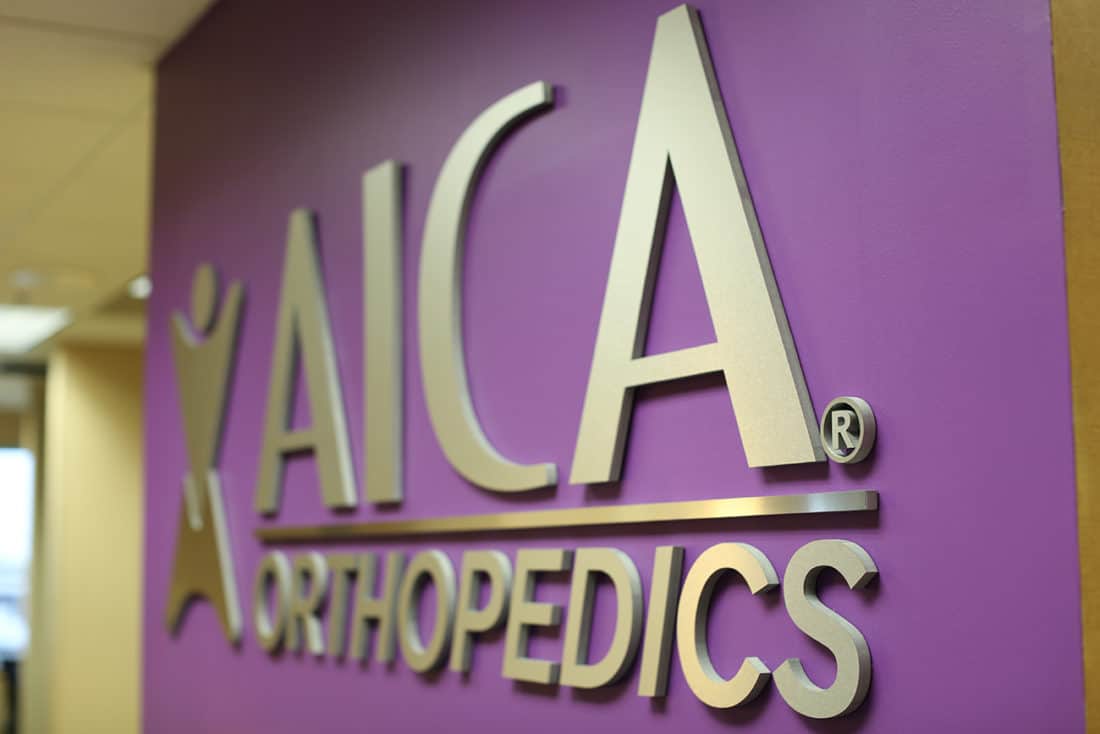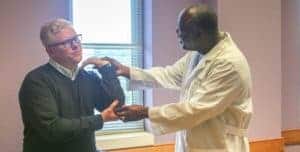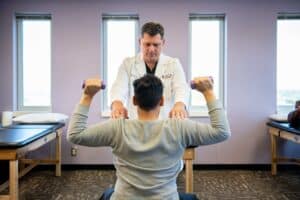Disc Herniation
If you are experiencing pain in the arms or legs, numbness or tingling in different parts of the body, weakness in various muscles, or extreme back or neck pain, you might be dealing with a bulging disc or herniated disc. Disc herniation (also known as a “slipped disc” or “ruptured disc”) is a medical condition when a spinal disc’s soft interior has ruptured and spilled out through the tougher exterior. Contact us at AICA Orthopedics for professional expertise with treating your disc herniation.
These spinal discs act as a cushion in between the vertebrae that make up the spine. Each spinal disc has a soft interior that is encased by a tougher exterior. The spinal discs are responsible for holding the bones of the spine together while also acting as shock absorbers that allow the spine to flex comfortably.
If you are experiencing general pain, numbness, or tingling in various parts of the body (particularly within the arm, foot, shoulder, legs, etc.), you may have a disc herniation. AICA Orthopedics has multiple orthopedic doctors and treatment solutions available to treat disc herniation. Each situation is unique and we can provide a solution for each. Contact us today to get started.
What Causes a Disc Herniation?
Disc herniation can take place as a result of two common causes: excessive strain or direct injury to the spinal disc or natural degeneration of the spinal disc material as an individual ages. In the first instance, a herniated disc can be caused by a direct impact on their body, often through sports injuries, automobile accidents, slips, and falls, and more. While spinal discs are capable of absorbing some impact, there are many types of injuries and impacts that can be too much for the spinal discs to handle, resulting in a herniated disc.
In the second instance, old age is the primary factor in disc herniation. As people get older, the disc material between the vertebrae becomes weakened due to normal wear and tear. The weaker the spinal disc material gets, the easier it is for minor impacts, strain, and twisting movements to cause a disc to rupture.
Diagnostics
x-ray
In the event of a disc herniation, your doctor will likely perform a physical examination first. Then, various diagnostic tests such as the x-ray will be ordered to assess the potential damage to the spine.
LEARN MORECT scan
Disc herniations can be indicative of soft tissue damage as well as spinal damage. CT scans might be necessary to show an image of the soft and hard tissue anatomy.
LEARN MOREMRI scan
MRI scans are also helpful in the diagnosis of a disc herniation. They utilize magnetic field gradients to produce images of the injured area. With this image, your specialist will be able to see the stress on the spine.
LEARN MOREEMG scan
Electromyography or EMG scans are also often utilized to indicate nerve and muscle responses to injuries involving the spine. These tests can help your doctor to visualize your specific pain in order for them to treat you effectively.
LEARN MORESymptoms of a Disc Herniation
The symptoms an individual experiences, when they have a herniated disc, will vary based on the individual, the severity of the injury, and where the impact or injury takes place in the spine. The size of the disc herniation (how much of the internal spinal disc material exits the tougher exterior of the disc) can also impact the type, frequency, and intensity of symptoms experienced. Here are the most common symptoms of a disc herniation:
- Pain in the arm, foot, shoulder, legs, buttocks, thigh, and/or calf
- General numbness or tingling sensation in different parts of the body
- Weakness overall or weakness in specific parts of the body that make it difficult to lift items, and may cause an increase in stumbling or unbalanced walking
- Burning sensation in similar parts of the body that you might experience pain
- Lower back pain
- Dull or sharp pain in the neck area or between the shoulder blades or at the spot of the herniation
When Should I See a Doctor
If you are at all ever concerned about your overall health, consult with a bone specialist as soon as possible. If you are experiencing severe back pain, stabbing pain, or chronic pain, you should make an appointment with your local Atlanta Orthopedic Clinic, AICA Orthopedics immediately. You should also seek medical attention right away if the pain you’re experiencing in your neck or back also travels down to the arm or leg or if you experience general weakness, tingling, and/or numbness in the same areas.
Diagnosing a Disc Herniation
During a physical exam, a doctor will examine various parts of the body to test for different statuses of the body’s systems, including reflexes, muscle strength, ability to walk, and ability to sense or detect light physical touches and vibration.
You may require specialized imaging tests in order to get an accurate depiction of the state your spine is in, including x-rays, CT scans (computerized tomography), MRIs (magnetic resonance imaging), electromyograms (to test electrical impulsesin the nerve tissue) and/or myelograms.
Getting Treatment for a Disc Herniation
Contact our team at AICA Orthopedics to get connected with an experienced healthcare professional and disc herniation specialist. We’ll diagnose the severity of the disc herniation and discuss the treatment options available. AICA Orthopedics consists of a variety of specialists to help you find proper disc herniation treatment for the best possible recovery. Our team of specialists at AICA Orthopedics are experienced to provide relief and solutions for disc herniation:
Orthopedic
Many orthopedic solutions are available to treat a disc herniation, including but not limited to an axial fusion, endoscopic foraminotomy, cervical disc replacement, microdiscectomy, transforaminal lumbar interbody fusion (TLIF), percutaneous discectomy, and more. The type of surgery recommended depends on the type and severity of your disc herniation.
LEARN MORENeurology
Neurological tests will be done to test the effectiveness of the nervous system in relation to a disc herniation. Neurological tests will analyze strength of the muscles, walking ability, sensory ability to detect light physical touches, reflexes, and more.
LEARN MOREChiropractic
A chiropractor will examine the entire spine and related systems of the body (e.g., reflexes, muscle strength, sensation loss, etc.) and can treat intervertebral disc injuries (often related to a herniated disc) to alleviate pain and other symptoms being experienced. Treatment typically involves spinal adjustments and techniques to ease symptoms of a herniated disc.
LEARN MOREDepending on the severity of the symptoms, additional treatment may be provided including pain medication, anticonvulsants, muscle relaxers, narcotics, and cortisone injections. For a small number of cases of a disc herniation, surgery may be required if symptoms haven’t improved from other forms of treatment.
Contact us with questions or to schedule an appointment to diagnose and treat a disc herniation.




